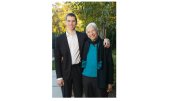When Noah Evers ’22 ran into problems with his final project for Psychology 15 (“Social Psychology”) during the spring 2020 semester, he went not to his professor for advice, but to his grandmother.
It wasn’t a bad idea. Psychologist Patricia Marks Greenfield ’62, Ph.D. ’66, who frequently babysat him as a child, holds the title Distinguished Professor at UCLA, where she has taught since 1974. Evers asked if she knew of any theories that could help ground his research on how the COVID-19 pandemic influenced independence and interdependence across the country. She recommended her own "theory of social change, cultural evolution, and human development.”
Though Evers’s class project didn’t work out as he’d hoped, due to methodological flaws, he was fascinated by his grandmother’s idea—that “during a period of increasing survival threat and decreasing prosperity, humans will shift toward the psychology and behavior typical of the small-scale, collectivistic, and rural subsistence ecologies in which we evolved.” When the coronavirus pandemic began, the theory was put to the test.
Greenfield had begun thinking about such widespread cultural changes at Harvard, where she completed her dissertation on indigenous village ecologies in Senegal and later worked with the Harvard Chiapas Project, which investigated cultural shifts in a remote region in southern Mexico. Even after leaving Massachusetts for California (the chair of Harvard’s psychology department, which had not yet merged with the department of social relations, had told her psychology would “never have a woman faculty member in our department”), she continued her studies on an indigenous Mayan village, observing how values shifted as the area became more commercial.
When lockdowns began and deaths began to rise, Greenfield, 80, noticed that some of her theory’s predictions were playing out in her own life. Though her interest in cooking had been waning for years, “Suddenly, I loved cooking again,” she said in an interview. “And I also had an impulse to grow a vegetable garden, out of nowhere.” She noticed that her grandchildren were helping more with responsibilities around their house. The changes reminded her of the collectivist cultures she’d observed in villages with higher risks of mortality—in which people produce their own food and clothing, and focus more on managing resources than accumulating wealth. For a study currently under review for publication, she began surveying thousands of people to see if the shifts she was observing in her own family were consistent across a wider population.
She also began a project with her grandson. Playing off the ideas of his Psych 15 project, which sought to analyze social changes through Instagram posts, the two began a new one, examining social-media trends to see if increasing mortality rates and resource scarcity triggered wide shifts toward more collectivist behavior. They predicted that as searches for terms like “death” and “cemetery” increased, so would searches for subsistence-related terms like “grow vegetables” and “baking bread” and collectivist terms like “sacrifice” and “share.” Using a tool called Talkwalker, which enables companies to track how their brands are mentioned across the internet, they found that the use of such terms did shoot up in tandem. In the end, they concluded that the responses reflected “evolutionary conserved instinctual adaptations to changing environmental conditions.” People wanted to bake sourdough bread or sew clothes not because they were bored, but because they felt instinctually compelled to feed their basic psychological needs under changing, and threatening, circumstances.
In the new journal Human Behavior and Emerging Technologies, the pair, along with Evers’s younger brother, Gabriel, also concluded that this societal shift toward collectivism may have contributed as well to significant social movements, including the widespread Black Lives Matter protests during June. “What we found online was reflected massively offline,” Noah Evers said.
As pandemic conditions abate, they expect that the changed behaviors will revert to the pre-pandemic state. “The human mind is constantly trying to figure out what’s most adaptive,” Greenfield explained. “As society gets less dangerous, it will always keep shifting toward that commercial-environment world.”
Greenfield sees the whole collaboration as a mini-illustration of her theory: at a time when she expected different generations to work together, that’s exactly what happened. And Noah Evers won’t forget the late nights he spent collaborating with his grandmother in the middle of a pandemic. “I would always tell my girlfriend, and she thought it was crazy,” he said. “I don’t know how many 80-year-olds are pulling all-nighters.”









